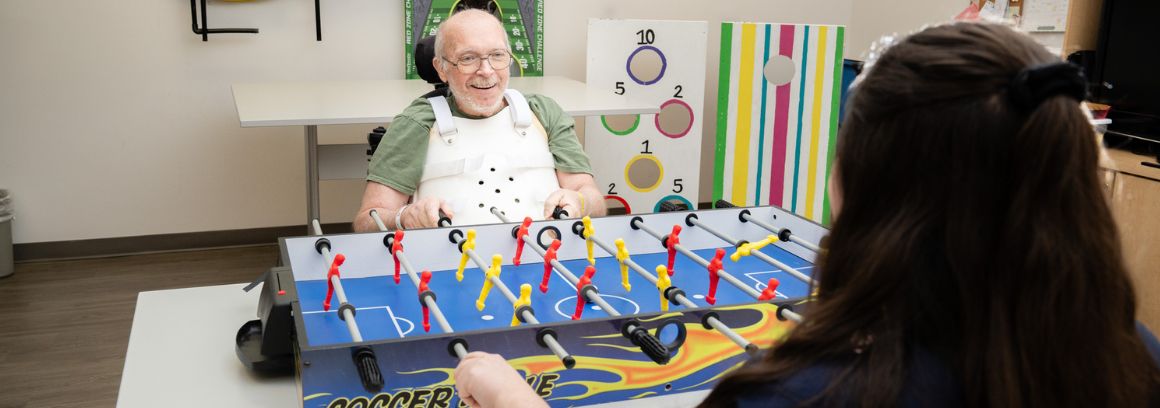Recreational Therapy at Brooks
The recreational therapy program at Brooks Rehabilitation’s inpatient hospitals evaluates a patient’s leisure interests and goals. The recreation staff then takes those interests and incorporates it into the overall therapy goals of the patient and speech, physical and occupational therapists.
Recreation Therapy Services
- Arts and crafts
- Aquatic therapy
- Adaptive sports
- Cards and board games
- Computers (including eye-gaze system, touch screen computer, iPad)
- Cooking and baking
- Exercise and sports
- Gardening and yardwork
- Outdoor activities (including putt-putt and yard games)
- Community reintegration outings
- Pet therapy
- Reading and writing
- Trikes and handcycles
- Scavenger hunts
- Video games (Wii, Xbox)
Community Reintegration
One of our main goals is to help our patients return to an active lifestyle. An integral way this is achieved is through community reintegration. We offer an opportunity for our patients to return to the community by attending outings led by the recreation therapy staff.
Some of our outings include, but are not limited to:
- Adaptive sports and recreation events
- Banks
- Department stores
- Grocery stores
- Home evaluations
- Museums
- Restaurants
- Sporting events
- The zoo
Recreational Therapy FAQs
Learn more about what recreation therapy is, who benefits and the care settings where this type of therapy is provided.
How is recreation therapy different from other therapies?
Although all forms of therapy promote the overall health and well-being of the patient, recreation therapy achieves this through recreation and leisure activities. Our certified recreational therapists deliver direct patient care using recreation and leisure activities as the primary modality. The goal of this practice is health restoration, remediation and rehabilitation for persons with limited functional abilities due to illness or disability.
What are the benefits of recreation therapy?
Recreation therapy helps improve a patient’s functioning in physical, emotional, social, cognitive, spiritual and leisure areas.
Who is appropriate for recreation therapy?
Persons of varying abilities and ages are appropriate to receive recreation therapy services while staying at our inpatient hospital.
Where is recreation therapy provided?
Recreation therapy is provided to patients staying at our inpatient hospital. We have a designated recreation gym on the east side of the second floor.
Training and qualifications of recreation therapists
Our Recreation Therapists have a bachelor’s degree in therapeutic recreation. All of our recreation therapists also have a national board certification, which is a certified recreation therapeutic specialist (CTRS). Therapists attend annual conferences to maintain continuing education for CTRS as well as the most innovative recreation modalities to serve patients.
Connect with Us
If you are interested in learning more about the recreation therapy department, please contact Kelly Devenny at [email protected].
For an internship in recreation therapy, please visit our internship and application page.
